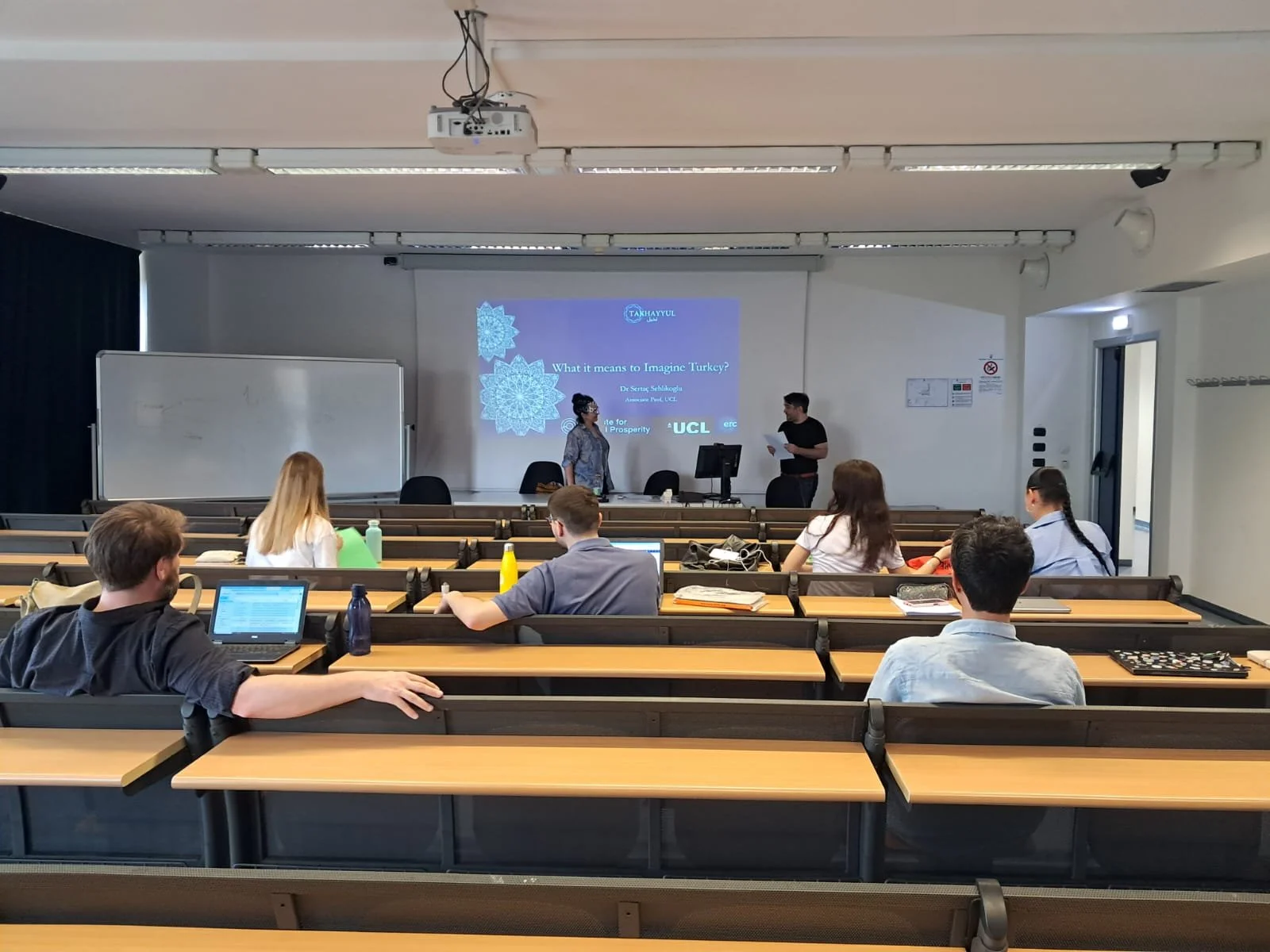“Expanding Imaginaries: Collaborations of Archival, Ethnographic, and Performative Studies” by Sertaç Sehlikoglu
Photo Credit: Christina Banapoulou
This past spring, I had the privilege of completing a three-month Professorial Fellowship at the University of Milan's Interdisciplinary Laboratory for Performance and Politics. What began as an academic collaboration evolved into something quite exciting—a challenge to expand our understanding of how imagination functions as essential infrastructure for collective survival and future-making.
Beyond Conventional Interdisciplinarity
Theorising imaginaries offers a more complex challenge than one may expect. My team of scholars at IGP's TAKHAYYUL project have studied it through archives and ethnographic fieldwork, but imaginaries also function as infrastructure for collective survival and future-making. We need to expand our interdisciplinary thinking beyond existing conventions, and Dr. Rüstem Ertuğ Altınay's Performance and Politics lab offered this expansion by connecting arts and politics in ways that fundamentally reshape how we approach scholarship.
The laboratory's vibrant scholarly environment, with its diverse community of scholars from the Global South, provided an invaluable space for advancing critical questions about imagination, power, and transformation. This wasn't simply about academic exchange—it was about creating new pathways for understanding how global prosperity can be reimagined through collaborative dialogue that transcends traditional disciplinary boundaries.
Productive Scholarship in Action
During my tenure, I completed my book "Is Critique Islamic?" and my book proposal "Imagining Turkey," both now under review with publishers. These works directly challenge Eurocentric approaches to knowledge production by demonstrating how classical Arab scholarship (900s-1600s) developed sophisticated epistemological frameworks that offer alternative ways of understanding critique, imagination, and social transformation.
"Is Critique Islamic?" addresses a critical gap in social theory by providing both scholarly analysis and practical pedagogical tools for incorporating classical Arab scholarship into contemporary social science curricula. Written with what I term "critical care," the book moves beyond simply filling genealogical gaps to fundamentally reconceptualising how we understand the relationship between knowledge, ethics, and critique.
"Imagining Turkey," meanwhile, reveals how imperial fantasies gain emotional power through everyday experiences—families watching Turkish historical dramas together, traders crossing borders, communities celebrating political victories. By tracing these processes across both temporal and spatial dimensions, the work unearths the interconnectivity of Turkey's contemporary political turn, locating it within broader historical trajectories and transnational networks.
Collaborative Knowledge Production
The fellowship also resulted in three significant co-authored publications that examine imagination as essential infrastructure for addressing contemporary global challenges:
"Failure of Imagination at Times of Polycrisis" introduces the concept of "intangible adversaries"—institutional, cognitive, and cultural forces that inhibit our capacity to render crises intelligible and futures conceivable. Drawing on takhayyul, the gnostic notion of imagination in Arabic, we theorise imagination as relational and epistemic infrastructure that requires revival for genuine prosperity.
"Cis Hell" develops a framework for understanding how regulatory normativity over all bodies operates through gender biopolitics as a global political pandemic. Connecting recent legal developments across multiple contexts, we demonstrate how biopower establishes transnational regimes of bodily control that threaten collective prosperity by constraining human potential.
"Kanal Istanbul Beyond Fantasy" uses Turkey's megaproject to understand how imaginative narratives function as political currency in contemporary populist governance. Employing takhayyul alongside dramaturgical analysis, we reveal how infrastructure projects operate as both material interventions and imaginative performances that systematically exclude alternative ecological futures.
Building Transnational Scholarly Networks
Perhaps most notably, this collaboration strengthened ties between IGP's TAKHAYYUL team and Milan's Performance and Politics Laboratory, creating lasting connections that will continue to generate innovative research approaches. The partnership exemplifies how international academic collaboration can produce new theoretical frameworks essential for addressing urgent global questions about social justice, ecological interdependence, and collective imagination.
As I reflect on these three months, I'm struck by how the laboratory's approach to connecting arts and politics opened new possibilities for thinking beyond conventional academic frameworks. This experience reinforces my conviction that addressing contemporary global challenges requires not just interdisciplinary collaboration but a fundamental reimagining of how we understand the relationship between knowledge production, creative practice, and social transformation.
The fellowship stands as a testament to the power of international scholarly collaboration to generate new forms of critical knowledge that can contribute to more just and sustainable futures. It's precisely these kinds of partnerships that position institutions like IGP as vital hubs for globally-engaged scholarship capable of addressing the complex challenges of our time.
Dr. Sertaç Sehlikoglu is Associate Professor of Global Prosperity at UCL's Institute for Global Prosperity and Principal Investigator of the ERC Starting Grant project TAKHAYYUL. The fellowship was jointly funded by the University of Milano's 'ABJECT-ARCHIVES' project and IGP's ERC TAKHAYYUL grant.


